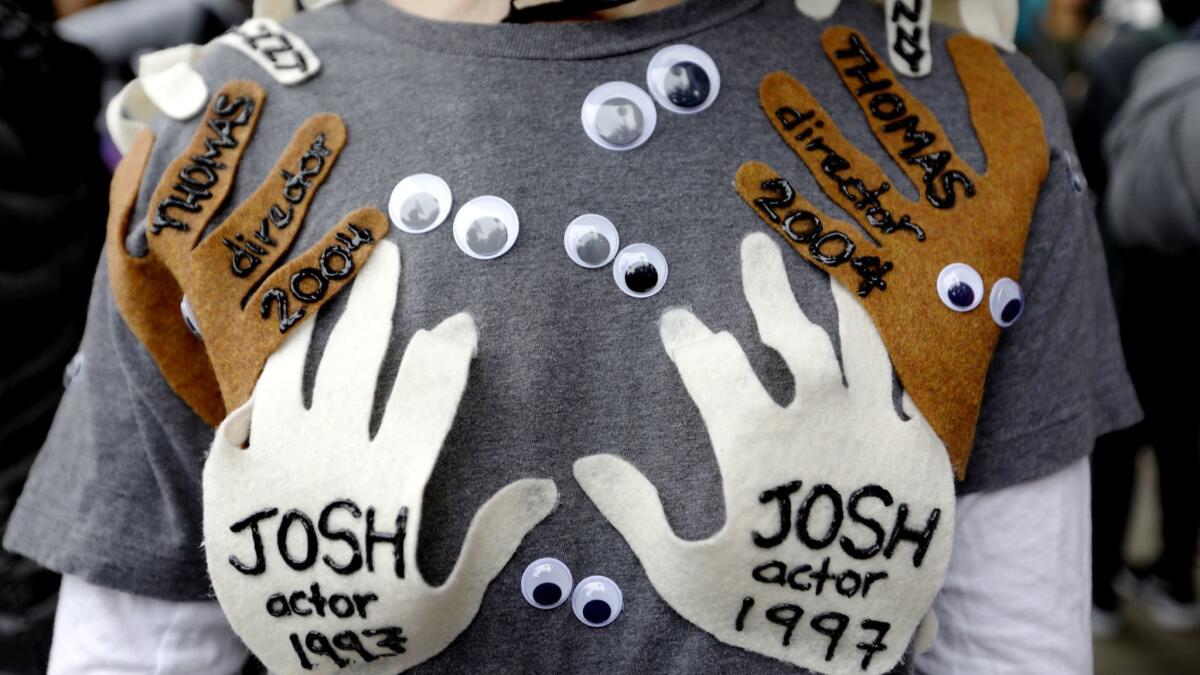Column: A code of conduct for grown-ups that everyone in Hollywood should already know but doesn’t

- Share via
“Code of conduct” may be the three most boring words in the universe, signifying a document many of us sign in the same desultory fashion we “agree” to the million conditions imposed while purchasing something from iTunes or to enter arbitration if our surgery goes awry.
In the wake of #MeToo, however, codes of conduct became the new Hollywood must-have, like LaCroix sparkling water, celebrity book imprints and Netflix deals — if only because they were the fastest, easiest way for any organization to make a Big Statement. Studios, industry guilds, film festivals, music festivals, even the entire Canadian entertainment Industry announced new or revised codes of conduct designed to prevent sexual harassment.
ALSO: Hollywood working moms and the brutal conflict between family and career »
The intentions are no doubt sincere, but honestly these “codes” simply spell out what everyone damn well should have known already — keep your hands and comments to yourself, don’t make people feel uncomfortable when they are trying to work, put on some clothes when you answer the door, masturbate on your own time and rape is against the law.
Apparently, however, some people need reminding, while others find the often general wording too restrictive — “I don’t know how to act anymore” is something men of otherwise normal intelligence have been heard to say.
As if the notion of treating others the way you would like to be treated yourself is some radical feminist manifesto and not, you know, a fundamental pillar of democracy, civilized society and most religions.
More recently, the Writers Guild of America weaponized the code of conduct. When talent agencies refused to sign the union’s revised edition, which demands, basically, that agents put the needs of their clients first, members fired their agents, the WGA filed a lawsuit and a lot of people seemed outraged that writers would dare write a code that did not form the basis for a movie franchise that agents could package.
So maybe it’s time for a code that gets really, truly basic. A code of conduct for grown-ups:
- Unless you are 13, don’t act like a 13-year-old. Temper tantrums, sulking fits, rumor-starting, rumor-spreading, icing out someone you are angry with, not doing what you have promised to do and then lying about it are all highly enjoyable activities that you surrender the right to participate in when you become an adult.
- Physical contact is a human necessity, but don’t pretend you don’t know the difference between a quick, friendly hug and a long, sexual one (here’s a hint: genitals do not touch in a friendly hug) or that you are confused about what sort of touching beyond a firm handshake is appropriate. If you are confused in any way, simply put your hands in your pockets and smile kindly.
- Hitting is bad, even for women, except when someone tries to feel you up under the guise of a “friendly hug.” Then feel free to hit that person really hard, so you only have to do it once.
- After you reach the age of 21, “party” ceases to be a verb and, no matter what you may think, smoking weed makes your clothes and hair smell exactly like you were just smoking weed.
- When you have a job, you are being paid to do a previously agreed-upon set of tasks to the best of your ability. Do that.
- When you give someone a job, you are paying them to do a previously agreed upon set of tasks to the best of their ability. Do not ask them to do a bunch of other stuff as well or expect those abilities to be superhuman without negotiating a different job description and commensurate salary.
- Pay people what their work is worth, not what you suspect you can get away with or what you think they deserve because of some random characteristic (race, gender, taste in clothing, wealthy spouse) that bugs you.
- Many people have children and every workplace needs to accommodate that.
- Many people do not have children and they should not be punished by extra work, unsolicited advice or weird looks at theme parks.
- “Do I look fat?” is a question you should only ask absolutely no one.
- Don’t lie. “I don’t know,” “I can’t / don’t want to discuss it,” “That’s none of your business” are all perfectly acceptable responses. But don’t tell someone they’re wrong when they aren’t, or that everything is fine when the engine is visibly on fire. Lying is cowardly and rarely in your best interest because it will just make you look doubly bad when you get found out. Which you will.
- NDAs are always fishy so you should probably never sign one.
- You cannot control what people think of you, and it’s none of your business anyway, so don’t worry about it.
- No matter what you have been raised to believe, laundry does not fold itself.
- “Do unto others as you would have them do unto you” really does work in pretty much every situation.
More to Read
The biggest entertainment stories
Get our big stories about Hollywood, film, television, music, arts, culture and more right in your inbox as soon as they publish.
You may occasionally receive promotional content from the Los Angeles Times.











